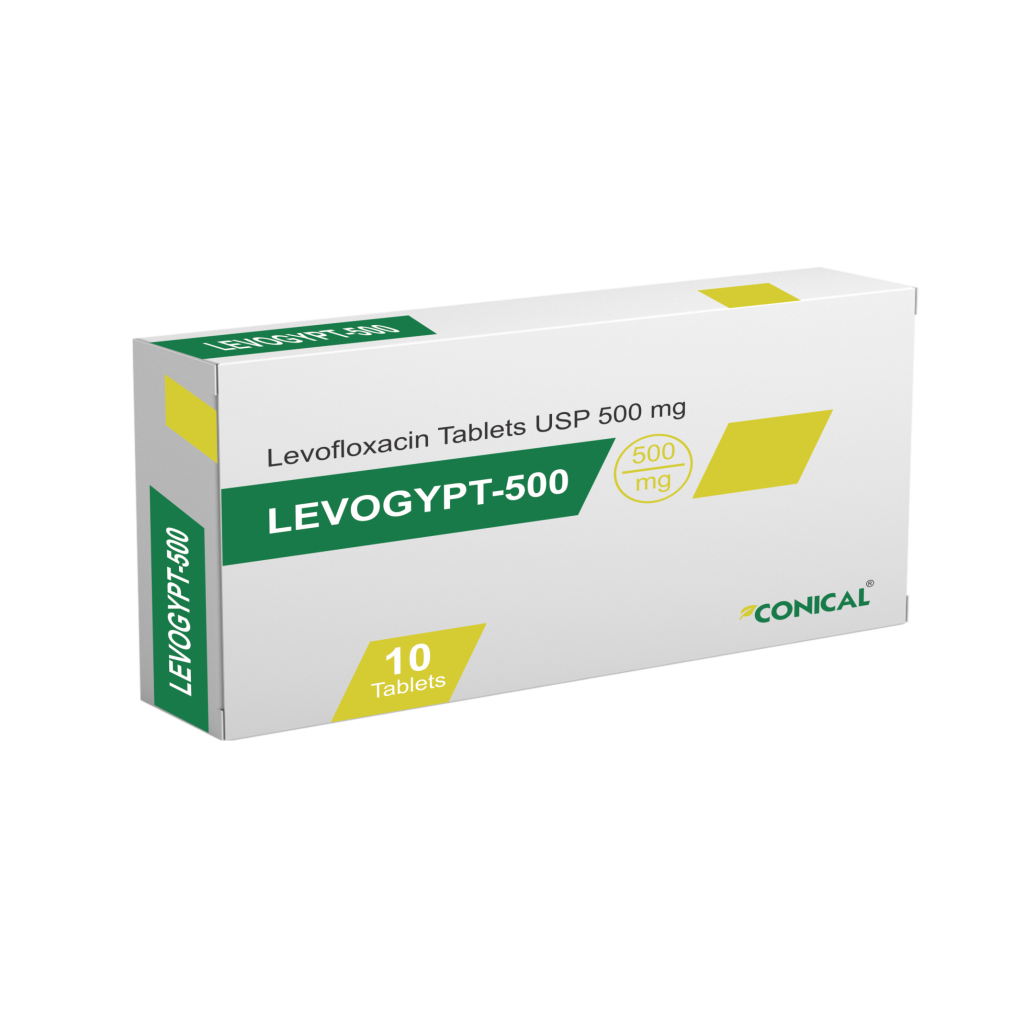
Levofloxacin Tablets 500 mg is indicated in adults for the treatment of the following infections:
Acute bacterial sinusitis, Uncomplicated cystitis, Acute exacerbation of chronic obstructive pulmonary disease including bronchitis, Complicated skin and soft tissue infections/complicated skin and skin structure infections
For the above-mentioned infections Levofloxacin Tablets 500 mg should be used only when it is considered inappropriate to use other antibacterial agents that are commonly recommended for the treatment of these infections.
Acute pyelonephritis and complicated urinary tract infections, Chronic bacterial prostatitis, Community-acquired pneumonia, Inhalation Anthrax: post exposure prophylaxis and curative treatment
Levofloxacin Tablets 500 mg may also be used to complete a course of therapy in patients who have shown improvement during initial treatment with intravenous levofloxacin.
Consideration should be given to official guidance on the appropriate use of antibacterial agents.
Levofloxacin Tablets 500 mg are administered once or twice daily.
The dosage depends on the type and severity of the infection and the susceptibility of the presumed causative pathogen. Levofloxacin Tablets 500 mg may also be used to complete a course of therapy in patients who have shown improvement during initial treatment with intravenous levofloxacin; given the bioequivalence of the parenteral and oral forms, the same dosage can be used.
Headache, Dizziness, Insomnia, Diarrhoea, Vomiting, Nausea, Hepatic enzyme increased (ALT/AST, alkaline phosphatase, GGT),
Methicillin-resistant S. aureus are very likely to possess co-resistance to fluoroquinolones, including levofloxacin. Therefore levofloxacin is not recommended for the treatment of known or suspected MRSA infections unless laboratory results have confirmed susceptibility of the organism to levofloxacin.
Resistance to fluoroquinolones of E. coli – the most common pathogen involved in urinary tract infections – varies. Prescribers are advised to take into account the local prevalence of resistance in E. coli to fluoroquinolones.
Inhalation Anthrax: Use in humans is based on in vitro Bacillus anthracis susceptibility data and on animal experimental data together with limited human data. Treating physicians should refer to national and/or international consensus documents regarding the treatment of anthrax.
The use of levofloxacin should be avoided in patients who have experienced serious adverse reactions in the past when using quinolone or fluoroquinolone containing products.
Tendinitis and tendon rupture: Tendinitis may rarely occur. It most frequently involves the Achilles tendon and may lead to tendon rupture. At the first sign of tendinitis (e.g. painful swelling, inflammation) the treatment with levofloxacin should be discontinued and alternative treatment should be considered.
Clostridium difficile-associated disease: Diarrhoea, particularly if severe, persistent and/or bloody, during or after treatment with levofloxacin (including several weeks after treatment), may be symptomatic of Clostridium difficile-associated disease (CDAD). It is therefore important to consider this diagnosis in patients who develop serious diarrhoea during or after treatment with levofloxacin. If CDAD is suspected or confirmed, levofloxacin should be stopped immediately and appropriate treatment initiated without delay. Anti-peristaltic medicinal products are contraindicated in this clinical situation.
Patients predisposed to seizures: Quinolones may lower the seizure threshold and may trigger seizures. Levofloxacin is contraindicated in patients with a history of epilepsy.
Patients with G-6- phosphate dehydrogenase deficiency: Patients with latent or actual defects in glucose-6-phosphate dehydrogenase activity may be prone to haemolytic reactions when treated with quinolone antibacterial agents. Therefore, if levofloxacin has to be used in these patients, potential occurrence of haemolysis should be monitored.
Patients with renal impairment: Since levofloxacin is excreted mainly by the kidneys, the dose of levofloxacin should be adjusted in patients with renal impairment.
Hypersensitivity reactions: Levofloxacin can cause serious, potentially fatal hypersensitivity reactions (e.g. angioedema up to anaphylactic shock), occasionally following the initial dose. Patients should discontinue treatment immediately and contact their physician or an emergency physician, who will initiate appropriate emergency measures.
Severe cutaneous adverse reactions: Severe cutaneous adverse reactions (SCARs) including toxic epidermal necrolysis (TEN: also known as Lyell’s syndrome), Stevens Johnson syndrome (SJS) and drug reaction with eosinophilia and systemic symptoms (DRESS), which could be life-threatening or fatal, have been reported with levofloxacin.
Dysglycaemia: As with all quinolones, disturbances in blood glucose, including both hypoglycaemia and hyperglycaemia have been reported, usually in diabetic patients receiving concomitant treatment with an oral hypoglycaemic agent (e.g. glibenclamide) or with insulin. Cases of hypoglycaemic coma have been reported. In diabetic patients, careful monitoring of blood glucose is recommended.
Prevention of photosensitization: Photosensitisation has been reported with levofloxacin. It is recommended that patients should not expose themselves unnecessarily to strong sunlight or to artificial UV rays (e.g. sunray lamp, solarium), during treatment and for 48 hours following treatment discontinuation in order to prevent photosensitisation.
Psychotic reactions: Psychotic reactions have been reported in patients receiving quinolones, including levofloxacin. In the event that the patient develops these reactions, levofloxacin should be discontinued and appropriate measures instituted. Caution is recommended if levofloxacin is to be used in psychotic patients or in patients with history of psychiatric disease.
QT interval prolongation: Caution should be taken when using fluoroquinolones, including levofloxacin in patients with known risk factors for prolongation of the QT interval.
Exacerbation of myasthenia gravis: Fluoroquinolones, including levofloxacin, have neuromuscular blocking activity and may exacerbate muscle weakness in patients with myasthenia gravis.
Superinfection: The use of levofloxacin, especially if prolonged, may result in overgrowth of non-susceptible organisms. If superinfection occurs during therapy, appropriate measures should be taken.
Store below 30°C temperature. Protect from light and moisture.
Keep the medicine out of reach of children.
Alu-Alu blister packs.
Levogypt-500 is available in an Alu-Alu blister of 10 tablets. Such 1 blister with package insert in an unit carton.
Contact us directly to receive full information on the product, the formulation, the science behind it, stability data, and more. Our Business Development Manager is a click away.
Conical Pharmaceuticals is a professionally managed and dynamic organization with decades of experience in the pharmaceutical field. With a desire of providing opportunities for a better life, we work very hard to bring quality drugs to our customers. We have instilled a level of trust and confidence amongst our clients by supplying the best quality products.